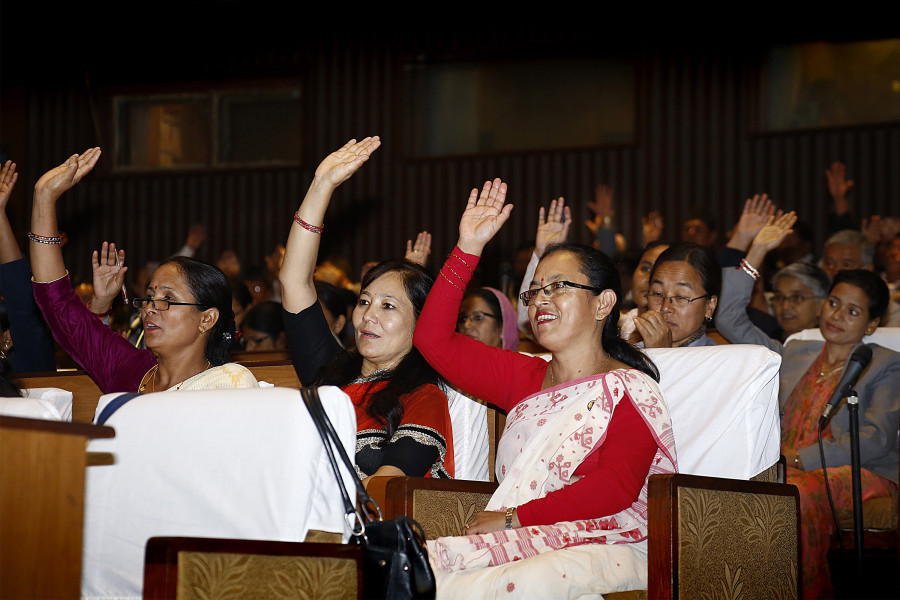National
Alliance politics impacts female candidacy in local level elections
Close to 41 percent women had won in 2017, but fewer will be elected this time, with nomination number itself down.
Binod Ghimire
In the 2017 local elections, Vijay Sarawagi of the Sanghiya Samajbadi Forum was elected mayor of Birgunj Metropolitan City while Shanti Karki of Nepali Congress won deputy mayor.
Both the parties had fielded male candidates for mayor and females for deputy mayor. However, in the next month’s local elections, chances of a woman winning any of the two top executive positions are slim because major parties have fielded only male candidates.
The ruling five-party alliance has fielded Rajesh Man Singh, a Janata Samajbadi Party leader, for mayor and Congress’ Imtiyaz Alam for deputy mayor.
Similarly, Sarawagi now is mayoral candidate of the CPN-UML and the party has ceded deputy mayoral candidacy to the Loktantrik Samajbadi Party’s Purushottam Jha as part of their electoral partnership in Birgunj.
As the real competition is going to be between the two alliances–ruling parties’ and UML’s, it is very likely that males will be elected to both the mayor and deputy mayor posts in the only metropolis in the Madhes Province. Though the Constitution of Nepal envisions proportional representation of women in all state bodies, the two alliances used a loophole in the Local Level Election Act-2017 to avoid fielding women for both the top posts in the metropolis.
The Local Level Election Act-2017 has made it mandatory for each political party fielding candidates for both the top positions to ensure that one of them is a woman. However, parties are free not to field women if they contest in only one of two executive positions—mayor/chair and deputy mayor/vice chair.
In Lalitpur Metropolitan City, Chiribabu Maharjan from Nepali Congress is a mayoral candidate and Maoist Centre’s Baburaja Bajracharya is contesting for deputy mayor from the five-party ruling alliance. Both are males.
Gita Satyal from the Congress had won deputy mayor from the metropolis. In three of the six metropolises, the ruling coalition has fielded male candidates for both the positions. Similarly, in eight of the 11 sub-metropolis cities the five-party alliance has fielded only male candidates for the two top positions.
“Neither the parties nor the Election Commission took initiative to ensure that women are fielded in at least one of the two positions,” Renu Chand, a leader from the CPN (Maoist Centre), told the Post. “We had raised the issue weeks before the start of the nomination process but to no avail.”
A group of cross party leaders led by Binda Pandey of the CPN-UML on April 8 had drawn the attention of Prime Minister Sher Bahadur Deuba and Chief Election Commissioner Dinesh Thapaliya to ensure that women’s participation in local governance doesn’t decrease.
However, a report from the Election Commission shows the number of women candidates in the upcoming local elections is significantly lower compared to males. Of the 152,465 candidates contesting for 35,221 positions in 753 local levels, only 37.84 percent—57,705—are women. The number of women also includes candidates for the two female ward members which is mandatory.
The share of women candidates is even lower than their share of victory from the 2017’s local elections. Of the 35,041 representatives elected from 2017 elections, close to 41 percent (14,352) were women. “When the number of candidates is already low, the number of winners will be even lower,” Mohna Ansari, a former member of the National Human Rights Commission, told the Post. “The number of women representatives is going to be significantly low this time compared to that from 2017. Together with the political parties, the Election Commission is responsible for this situation.”
Ansari, who also is an advocate, moved the Supreme Court on April 19 demanding its intervention to ensure parties, no matter whether they contest alone or in a coalition, field a woman in one of the two top positions—mayor/chairperson and deputy mayor/vice-chairperson. However, the court on Wednesday refrained from issuing an interim although it has issued a show cause notice against the government and the commission.
She had claimed that not nominating a woman in both the positions contradicts Article 38 (4) of the constitution that guarantees proportional representation of women in all state bodies. “The court administration delayed hearing of my petition and by the time it was heard it was late,” Ansari told the Post. The commission had allotted Sunday and Monday for the parties to register their candidates for the May 13 elections.
The hearing on her petition began Sunday when a single bench of Justice Til Prasad Shrestha called both the parties for discussions on Monday morning. However, the hearing couldn’t take place on Monday and Tuesday. By the time the hearing took place on Wednesday, the candidacy filing process had already completed. “I feel cheated by the judiciary because they didn’t give the issue the priority it deserved,” she told the Post.




 8.88°C Kathmandu
8.88°C Kathmandu















